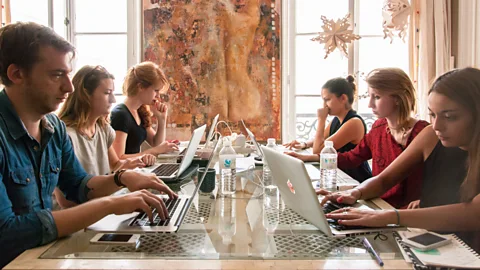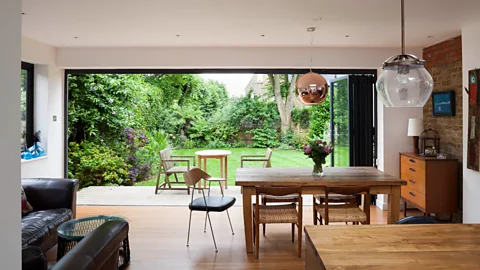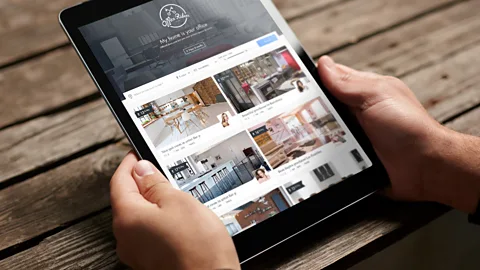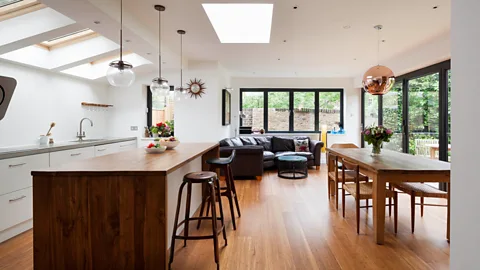Alternative workspaces: Turning your home into a breadwinner
 OfficeRiders
OfficeRidersWhen 48-year-old Londoner Cathy Eastburn had to give up full-time work in early 2015 due to ill health, she began looking for ways to make some additional income. That’s when she stumbled across Vrumi, a website that helped her rent out her living room as office space for location independent workers.
The 9m-by-4m-space Eastburn offers in her Clapham house can be used for meetings, group work, therapy sessions or even yoga classes, and she said she’s welcomed everyone from a film crew to a neuro-linguistic programming practitioner seeing clients.
 Vrumi
VrumiThe beauty of it is that Eastburn, a mother of two school age girls, can decide when she wants to have guests and when she wants to keep the home private. She currently hosts two or three times each month for an average of two days at a time, charging £50 ($73) a day and keeping £47.25 ($69) of it after Vrumi takes its cut. She also rents out her kitchen for an additional £20 ($29) per day.
“It’s really useful money for not a lot of work, especially for someone like me who is home anyway,” she explained.
Dubbed the “Airbnb of office space,” new platforms like Vrumi in London, Office Riders in Paris and Peerspace in San Francisco and New York, are doing by day the very thing Airbnb does by night. Each takes what economists call “dead space” (something that sits idle and unused for a period of time) and re-fashions it as moneymaking real estate. This in turn opens up a new market for workers in search of a money-saving alternative to the traditional workspace.
 Office Riders
Office Riders“The idea of generating income out of something you’ve already got has become very desirable since Airbnb came around,” explained Vrumi co-founder Roddy Campbell. “Meanwhile the nature of employment is fragmenting … You don’t need stock paper or filing cabinets anymore; you can just pick up your laptop and move around knowing that all of your documents are in the cloud.”
This segment is growing rapidly. In the US, for example, the number of employees who work remotely grew 6.5% between 2013 and 2014, while the employee population as a whole grew just 1.8%, according to GlobalWorkplaceAnalytics.com. As more workers eschew traditional offices, a new crop of start-ups has risen to the challenge of finding them unique settings from which to conduct business.
The rise of alternatives workspaces
The concept of renting out spare space in one’s home as office space took root in several major cities in early 2015 due to a combination of factors, including skyrocking rents, a growing gig-based economy, and an increasing familiarity with so-called “sharing economy” platforms like Airbnb and Uber.
Another more subtle reason, according to Ed Glickman, professor of real-estate finance at Drexel University in Philadelphia, is that coffee shops in big cities started removing chairs to drive up turnover. “The notion that you can go and park yourself at your local Starbucks for the day is changing,” Glickman explained. “So as the number of public spaces that facilitate working for free-er have gone down, that’s pushed people into taking up memberships in co-working spaces or looking for alternative solutions.”
The number of co-working facilities worldwide doubled year-on-year to about 6,000 in 2015, according to a recent study from Emergent Research, but an increasing number of people have also begun using the peer-to-peer model to find a more ideal work setting to meet their specific needs.
My home, your workplace
The new crop of online marketplaces that display spare home space operate under the same general model as Airbnb. Hosts put up photos and a description of their space, specify when it’s available, lay down some basic rules (like a maximum number of guests) and respond to queries through an internal messaging system. Bookings can be for as short as one hour or as long as a few weeks, depending on the website, and users provide feedback through peer reviews.
Daily prices start at about $15 on the low end and balloon up to $700 or more for a fancy meeting space in a prime part of town. The websites take a small cut of each transaction that’s typically about 15%, split between the host and guest.
“Depending on the price of their apartment and the number of people it can hold, some people right now are making about 1,000 euro ($1,075) a month” hosting two or three times each week, explained Florian Delifer, co-founder of Office Riders. “You can almost make your own rent just by renting the space out to others during the day.”
 Vrumi
VrumiWhile some hosts are out to make a profit, Delifer said others work from home already, have extra space, and enjoy the camaraderie and intellectual stimuli of working with likeminded individuals.
Who’s using these websites?
Campbell, of Vrumi, said hosts tend to fall into one of three categories: empty nesters with extra space, cash-squeezed stay-at-home parents, and “the Airbnb generation” (those under 30 with no kids and no qualms about having strangers in their apartment).
Users, meanwhile, tend to be self-employed workers, freelancers, owners of micro-businesses or other professionals seeking alternatives to the standard office and more traditional co-working spaces. A journalist may rent a space in London to conduct an interview, a singing teacher might find a Paris apartment that’s closer to his students, or a physiotherapist may book a more central location in Manhattan to see her clients once a week.
Peerspace, in the US, differs slightly from Vrumi and Office Riders in that it specialises in linking hosts who have underutilised space with professionals looking for a unique venue for an offsite meeting, product launch or special event. Consequently, these spaces tend to be high-design “creative lofts” in prime parts of town that can accommodate a dozen or more people.
The potential pitfalls
While it’s a “good money making proposition,” for hosts, Glickman, the professor at Drexel, said there are legal issues to consider.
“Can you utilise your residential space as a workspace? In a lot of major cities people pay high fees for residential condos and don’t necessarily want to have a bunch of strangers walking past security and working in someone’s living room because it creates a burden on the infrastructure,” he said.
“But let’s say that you control your own private house and you’re not necessarily bothering anyone but yourself by having people around,” Glickman added. “I don’t see why that would be problematic.”
There are also issues of theft and damages to consider, as your personal insurance is unlikely to cover the use of residential property for commercial purposes. Office Riders offers a host guarantee of up to 10,000 euros ($10,910), and Campbell said Vrumi is working on finalising an opt-in insurance to cover damages and liability. Peerspace, meanwhile, recommends obtaining short-term event insurance.
How easy is it?
Eastburn said that while she enjoys hosting people at her house, it can often be a more complex transaction than what she’s experienced on Airbnb.
“People who sign up for an Airbnb pretty much know what they’re getting, but with Vrumi it’s a little bit more complicated,” she explained. “People may have quite specific requirements for whatever work they’re doing, so there is, necessarily, a bit more preamble and a bit more liaison ahead of time between the host and guest.”
Eastburn confessed that she was a bit nervous about welcoming strangers into her living room without entirely knowing their intentions for the day. “But my fears were unfounded,” she said. “People tend to be on their best behaviour because, in the end, everyone wants a great review.”
